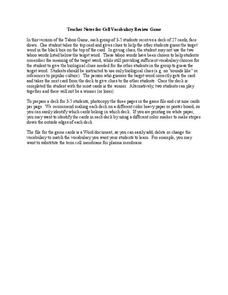Serendip
Cell Vocabulary Review Game
Can science scholars describe a nucleus without mentioning DNA, or a chloroplast without mentioning the color green? Test their organelle understanding through an exciting card game. Groups take turns guessing the correct organelle or...
Virginia Department of Education
Structure and Function of Cell Membranes
Lead your high school class on an exploration inside the cell. Individuals investigate the relationships between cells structure and function given their relative locations on the cell membrane. They explore the concept of homeostasis...
Curated OER
Osmosis and Dialysis
How do you engage pupils in a discussion about osmosis without leaving them overwhelmed? By providing them with the tools to perform an exciting experiment, and they will see osmosis in action! Young chemists and biologists use a potato...
Gallantsbiocorner.com
Cell Membrane & Transport
Young scientists demonstrate their understanding of cell transport on this comprehensive worksheet. Focusing on cellular structure and the different processes that allow materials to move into, out of, and throughout animal cells, this...
Curated OER
Potato Lab
In this osmosis instructional activity, students put a strip of potato in three different solutions and document the changes in the potato to determine is the solutions were hypotonic, hypertonic, or isotonic. This instructional activity...
Curated OER
Keeping a Balance
In this cell fluid balance worksheet, students read about how fluids are transported in and out of a cell through the cellular membrane. Students compare cells that are isotonic, hypertonic, and hypotonic. This worksheet has 3 matching...
Curated OER
Osmosis
In this biology worksheet, students determine how many solvent and solute molecules there are in the red blood cell and the IV fluid. Then they determine whether the IV fluid is hypertonic, hypotonic, or isotonic to the red blood cell.
Biology Pages
Kimball's Biology Pages: Transport Across Cell Membranes
This site has information on how facilitated diffusion of ions takes place through proteins, or assemblies of proteins, embedded in the plasma membrane. Includes a helpful diagram.









